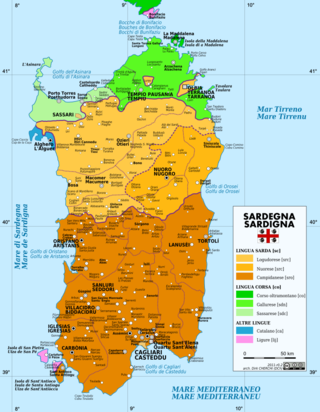Procurad'e moderare,
barones, sa tirannia,
chi si no, pro vida mia
torrades a pe' in terra!
Declarada est già sa gherra
contra de sa prepotenzia:
e incomintza' sa passenzia
in su populu a mancare!
Mirade ch'est'atzendende
contra de ois su fogu,
mirade chi no e' giogu,
chi sa cosa andat 'e veras;
mirade chi sas aeras
minettana temporale;
zente cussizzada male,
iscultade sa oghe mia
No apprettedas s 'isprone
A su poveru ronzinu,
Si no in mesu caminu
S'arrempellat appuradu;
Mizzi chi est lanzu e cansadu
E non 'nde podet piusu;
Finalmente a fundu in susu
S'imbastu 'nd hat a bettare
Su pobulu chi in profundu
Letargu fit sepultadu
Finalmente despertadu
S'abbizzat ch 'est in cadena,
Ch'istat suffrende sa pena
De s'indolenzia antiga:
Feudu, legge inimiga
A bona filosofia!
Che ch'esseret una inza,
Una tanca, unu cunzadu,
Sas biddas hana donadu
De regalu o a bendissione;
Comente unu cumone
De bestias berveghinas
Sos homines et feminas
Han bendidu cun sa cria
Pro pagas mizzas de liras,
Et tale olta pro niente,
Isclavas eternamente
Tantas pobulassiones,
E migliares de persones
Servint a unu tirannu.
Poveru genere humanu,
Povera sarda zenia!
Deghe o doighi familias
S'han partidu sa Sardigna,
De una manera indigna
Si 'nde sunt fattas pobiddas;
Divididu han sas biddas
In sa zega antichidade,
Però sa presente edade
Lu pensat rimediare.
Naschet su Sardu soggettu
A milli cumandamentos,
Tributos e pagamentos
Chi faghet a su segnore,
In bestiamen e in laore
In dinari e in natura,
E pagat pro sa pastura,
E pagat pro laorare.
Meda innantis de sos feudos
Esistiana sas biddas,
Et issas fìni pobiddas
De saltos e biddattones.
Comente a bois, Barones,
Sa cosa anzena est passada?
Cuddu chi bos l'hat dada
Non bos la podiat dare.
No est mai presumibile
Chi voluntariamente
Hapat sa povera zente
Zedidu a tale derettu;
Su titulu, ergo, est infettu
De infeudassione
E i sas biddas reione
Tenene de l'impugnare
Sas tassas in su prinzipiu
Esigiazis limitadas,
Dae pustis sunt istadas
Ogni die aumentende,
A misura chi creschende
Sezis andados in fastu,
A misura chi in su gastu
Lassezis s 'economia.
Non bos balet allegare
S'antiga possessione
Cun minettas de presone,
Cun gastigos e cun penas,
Cun zippos e cun cadenas
Sos poveros ignorantes
Derettos esorbitantes
Hazis forzadu a pagare
A su mancu s 'impleerent
In mantenner sa giustissia
Castighende sa malissia
De sos malos de su logu,
A su mancu disaogu
Sos bonos poterant tenner,
Poterant andare e benner
Seguros per i sa via.
Est cussu s'unicu fine
De dogni tassa e derettu,
Chi seguru et chi chiettu
Sutta sa legge si vivat,
De custu fine nos privat
Su barone pro avarissia;
In sos gastos de giustissia
Faghet solu economia
Su primu chi si presenta
Si nominat offissiale,
Fattat bene o fattat male
Bastat non chirchet salariu,
Procuradore o notariu,
O camareri o lacaju,
Siat murru o siat baju,
Est bonu pro guvernare.
Bastat chi prestet sa manu
Pro fagher crescher sa renta,
Bastat si fetat cuntenta
Sa buscia de su Segnore;
Chi aggiuet a su fattore
A crobare prontamente
E s'algunu est renitente
Chi l'iscat esecutare
A boltas, de podattariu,
Guvernat su cappellanu,
Sas biddas cun una manu
Cun s'attera sa dispensa.
Feudatariu, pensat
Chi sos vassallos non tenes
Solu pro crescher sos benes,
Solu pro los iscorzare.
Su patrimoniu, sa vida
Pro difender su villanu
Cun sas armas a sa manu
Cheret ch 'istet notte e die;
Già ch 'hat a esser gasie
Proite tantu tributu?
Si non si nd'hat haer fruttu
Est locura su pagare.
Si su barone non faghet
S'obbligassione sua,
Vassallu, de parte tua
A nudda ses obbligadu;
Sos derettos ch'hat crobadu
In tantos annos passodos
Sunu dinaris furados
E ti los devet torrare.
Sas rèntas servini solu
Pro mantenner cicisbeas,
Pro carrozzas e livreas,
Pro inutiles servissios,
Pro alimentare sos vissios,
Pro giogare a sa bassetta,
E pro poder sa braghetta
Fora de domo isfogare,
Pro poder tenner piattos
Bindighi e vinti in sa mesa,
Pro chi potat sa marchesa
Sempre andare in portantina;
S'iscarpa istrinta mischina,
La faghet andare a toppu,
Sas pedras punghene troppu
E non podet camminare
Pro una littera solu
Su vassallu, poverinu,
Faghet dies de caminu
A pe', senz 'esser pagadu,
Mesu iscurzu e isporzadu
Espostu a dogni inclemenzia;
Eppuru tenet passienzia,
Eppuru devet cagliare.
Ecco comente s 'impleat
De su poveru su suore!
Comente, Eternu Segnore,
Suffrides tanta ingiustissia?
Bois, Divina Giustissia,
Remediade sas cosas,
Bois, da ispinas, rosas
Solu podides bogare.
Trabagliade trabagliade
O poveros de sas biddas,
Pro mantenner in zittade
Tantos caddos de istalla,
A bois lassant sa palla
Issos regoglin' su ranu,
E pensant sero e manzanu
Solamente a ingrassare.
Su segnor feudatariu
A sas undighi si pesat.
Dae su lettu a sa mesa,
Dae sa mesa a su giogu.
Appustis pro disaogu
Andat a cicisbeare;
Giompid'a iscurigare
Teatru, ballu, allegria
Cantu differentemente,
su vassallu passat s'ora!
Innantis de s'aurora
Già est bessidu in campagna;
Bentu o nie in sa muntagna.
In su paris sole ardente.
Oh! poverittu, comente
Lu podet agguantare!.
Cun su zappu e cun s'aradu
Penat tota sa die,
A ora de mesudie
Si zibat de solu pane.
Mezzus paschidu est su cane
De su Barone, in zittade,
S'est de cudda calidade
Chi in falda solent portare.
Timende chi si reforment
Disordines tantu mannos,
Cun manizzos et ingannos
Sas Cortes han impedidu;
Et isperdere han cherfidu
Sos patrizios pius zelantes,
Nende chi fint petulantes
Et contra sa monarchia
Ai caddos ch'in favore
De sa patria han peroradu,
Chi s'ispada hana ogadu
Pro sa causa comune,
O a su tuju sa fune
Cheriant ponner meschinos.
O comente a Giacobinos
Los cheriant massacrare.
Però su chelu hat difesu
Sos bonos visibilmente,
Atterradu bat su potente,
Ei s'umile esaltadu,
Deus, chi s'est declaradu
Pro custa patria nostra,
De ogn'insidia bostra
Isse nos hat a salvare.
Perfidu feudatariu!
Pro interesse privadu
Protettore declaradu
Ses de su piemontesu.
Cun issu ti fist intesu
Cun meda fazilidade:
Isse papada in zittade
E tue in bidda a porfia.
Fit pro sos piemontesos
Sa Sardigna una cucagna;
Che in sas Indias s 'Ispagna
Issos s 'incontrant inoghe;
Nos alzaiat sa oghe
Finzas unu camareri,
O plebeu o cavaglieri
Si deviat umiliare...
Issos dae custa terra
Ch'hana ogadu migliones,
Beniant senza calzones
E si nd'handaiant gallonados;
Mai ch'esserent istados
Chi ch'hana postu su fogu
Malaittu cuddu logu
Chi criat tale zenìa
Issos inoghe incontràna
Vantaggiosos imeneos,
Pro issos fint sos impleos,
Pro issos sint sos onores,
Sas dignidades mazores
De cheia, toga e ispada:
Et a su sardu restada
Una fune a s'impiccare!
Sos disculos nos mandàna
Pro castigu e curressione,
Cun paga e cun pensione
Cun impleu e cun patente;
In Moscovia tale zente
Si mandat a sa Siberia
Pro chi morzat de miseria,
Però non pro guvernare
Intantu in s'insula nostra
Numerosa gioventude
De talentu e de virtude
Ozïosa la lassàna:
E si algun 'nd'impleàna
Chircaiant su pius tontu
Pro chi lis torrat a contu
cun zente zega a trattare.
Si in impleos subalternos
Algunu sardu avanzàna,
In regalos non bastada
Su mesu de su salariu,
Mandare fit nezessariu
Caddos de casta a Turinu
Et bonas cassas de binu,
Cannonau e malvasia.
De dare a su piemontesu
Sa prata nostra ei s'oro
Est de su guvernu insoro
Massimu fundamentale,
Su regnu andet bene o male
No lis importat niente,
Antis creen incumbeniente
Lassarelu prosperare.
S'isula hat arruinadu
Custa razza de bastardos;
Sos privilegios sardos
Issos nos hana leadu,
Dae sos archivios furadu
Nos hana sas mezzus pezzas
Et che iscritturas bezzas
Las hana fattas bruiare.
De custu flagellu, in parte,
Deus nos hat liberadu.
Sos sardos ch'hana ogadu
Custu dannosu inimigu,
E tue li ses amigu,
O sardu barone indignu,
E tue ses in s'impignu
De 'nde lu fagher torrare
Pro custu, iscaradamente,
Preigas pro su Piemonte,
Falzu chi portas in fronte
Su marcu de traitore;
Fizzas tuas tant'honore
Faghent a su furisteri,
Mancari siat basseri
Bastat chi sardu no siat.
S'accas 'andas a Turinu
Inie basare dès
A su minustru sos pes
E a atter su... già m 'intendes;
Pro ottenner su chi pretendes
Bendes sa patria tua,
E procuras forsis a cua
Sos sardos iscreditare
Sa buscia lassas inie,
Et in premiu 'nde torras
Una rughitta in pettorra
Una giae in su traseri;
Pro fagher su quarteri
Sa domo has arruinodu,
E titolu has acchistadu
De traitore e ispia.
Su chelu non faghet sempre
Sa malissia triunfare,
Su mundu det reformare
Sas cosas ch 'andana male,
Su sistema feudale
Non podet durare meda?
Custu bender pro moneda
Sos pobulos det sensare.
S'homine chi s 'impostura
Haiat già degradadu
Paret chi a s'antigu gradu
Alzare cherfat de nou;
Paret chi su rangu sou
Pretendat s'humanidade;
Sardos mios, ischidade
E sighide custa ghia.
Custa, pobulos, est s'hora
D'estirpare sos abusos!
A terra sos malos usos,
A terra su dispotismu;
Gherra, gherra a s'egoismu,
Et gherra a sos oppressores;
Custos tirannos minores
Est prezisu humiliare.
Si no, chalchi die a mossu
Bo 'nde segade' su didu.
Como ch'est su filu ordidu
A bois toccat a tèssere,
Mizzi chi poi det essere
Tardu s 'arrepentimentu;
Cando si tenet su bentu
Est prezisu bentulare.











